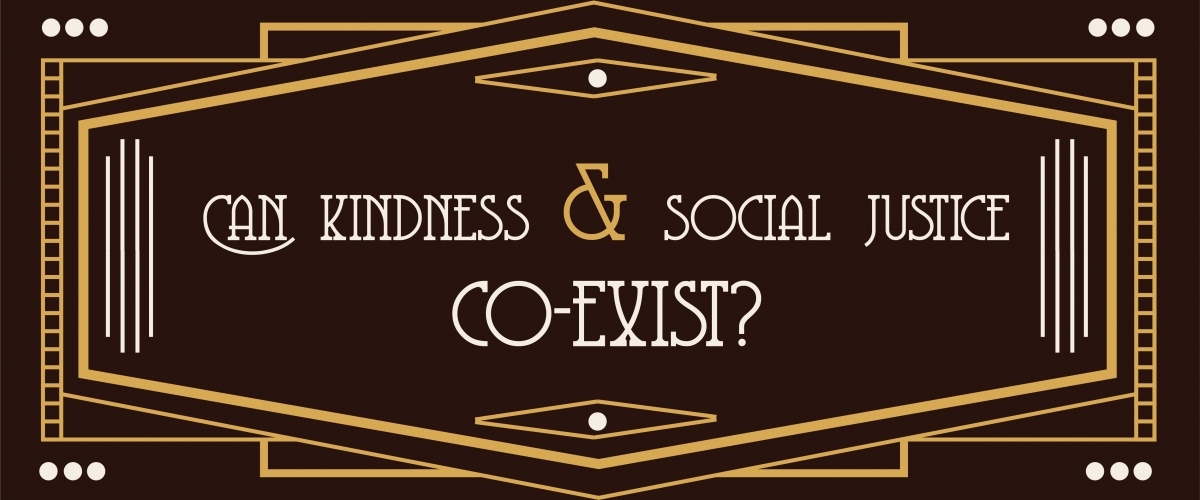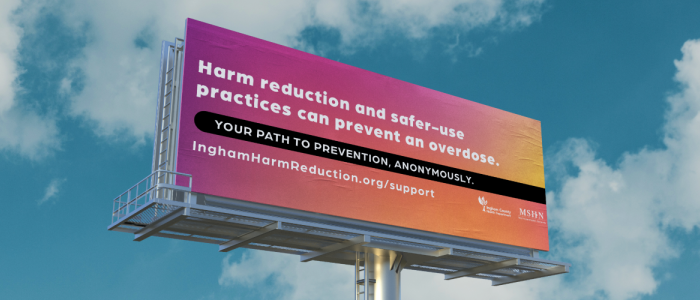
At P&G, our team has the awesome opportunity to work in partnership with a business coach to help us grow and strengthen our business, and ourselves. But Keith has become more than a coach to us over the years. He is a sounding board, a therapist, a stalwart supporter, an inspiring advocate and a friend. We talk a lot with him and each other about presuming positive intent, but is that always possible? In this divisive world, do we have to be kind to people we disagree with at our cores? Can kindness exist in the face of hate? As we analyze the notion of kindness this month, we wanted to amplify and share his unique thoughts.
By now, we’ve all heard about the stir Ellen caused when she was photographed with George Bush. How dare she be in the presence of someone whose political ideologies oppose her own, let alone allow a picture!
More recently, Nina West and Monét Exchange, superstars from RuPaul’s Drag Race, were criticized by the LGBTQIA+ community for appearing on The View to celebrate Meaghan McCain’s birthday. After all, Meaghan’s husband is the co-founder and publisher of The Federalist, a conservative online magazine which hasn’t been supportive of the community (OK. They’ve been down right horrible).
How have we arrived here? We used to be able to talk, to try to understand, to find commonality in the midst of our differences, but now it seems we only look for people to agree with us. Anything less than that is reason for public shunning.
Maya Angelou taught us that when people know better they do better. If we remove ourselves from individuals who differ from us, how do they learn? How do we?
As someone who knows Andrew Levitt, the creator of the character Nina West, I found myself stepping forward and responding to individuals who called for his head on a pike while they labeled him a sellout. Frequently, their rationale was based upon optics. Since optics are a PR issue, I’m coming to all of you PR folks out there with my questions:
Is there room for kindness and presumed positive intent in the media now? If so, how do we foster it?
Has social media and the ability for everyone to have a voice made our culture more skeptical? If so, what can we do to change it?
Is there room for authentic conversation in the midst of a flurry of negative stories and tweets and posts? If so, how do we introduce it?
And yet, how do we handle it when it goes beyond a news story or a tweet? Do I have to be nice to you if you’ve discounted me as a human?
I don’t know all the answers. I do know it’s one thing if we’re talking politics and another if you’ve disrespected me. I’ll give you the presumption of positive intent until you prove to me otherwise.
As a white male, I experience certain privileges in this world. That I know. But I’m also a gay man. I’m a vocal advocate for the LGBTQ community. And I love, support and participate in the art of drag. Which means for some people, I’m lesser than. And if you suggest you are better than someone else (woman, LGBTQIA, immigrant, poor, person of color), myself included, my presumption of positive intent is out the window.
We can disagree over politics. We can’t disagree over values.
Politically, we can disagree on how best to stimulate the economy, and we can still be friends. You can’t vote for Trump and then turn around and tell me support me as a gay man. Those two things don’t go together, and when you had to cast your vote, you showed me where you stood. Regardless of emotion, the communication of these facts should be expressed with kindness, not venom. [Edit: 11/16]
And yet, only I can decide how I CHOOSE to disagree.
That’s the thing. Ellen can choose to smile for a photo with a former president. Nina can choose to deliver a birthday cake. And Nina could be invited to The View to co-host. And if the topic was LGBTQIA-related, Nina could choose to call Meaghan out on why she espouses support but sits on the board of the Federalist, which doesn’t support LGBTQIA people.
But we can’t force people into advocacy. We can’t force them into the fight, or assume they’re not fighting based on our limited knowledge of their lives.
And it’s okay if we choose to disagree differently. Yes, people in positions of power and privilege have… well… power and privilege. But it’s their choice to use it how they see fit, and it has to be okay for us to each make that choice for ourselves.
I choose to lead with kindness. I don’t have to be unkind to disagree. I choose to leave emotions out of the conversation. The line for me is about disrespect, and even then, I believe I can be direct and forceful without being unkind.
Following recent events, we are reminded there are winners and losers in presidential elections. How one acts when one wins or loses matters. Both the winner and the loser should be trying to find a way to bring the country together, to make the lives of the citizens better. Kindness should guide both of them. [Edit: 11/16]
I don’t know what the right choice for you is. None of us can know what’s right for anyone else.
One thing I do know for sure: I believe if I approach everything with cynicism and criticism, I won’t learn or grow or change anything. Simply put, that’s not the world I want to live in. So I choose kindness.
What do you choose?
Keith Speers is the CEO of Consulting Without Limits, where he builds the capacity of brave individuals and companies to imagine and execute extraordinary ideas that improve our world. He is also the co-host of the 200 Proof Life podcast and the founder of Columbus’s Night of 100 Drag Queens. He was recently inducted into the North American Gay Athletic Association’s Hall of Fame for his contributions to the international softball community. He lives with his beloved Michael-Not-On-Twitter and their feisty household president, Bartlett the Silky Terrier, in Columbus. And he is an inherently kind human.



